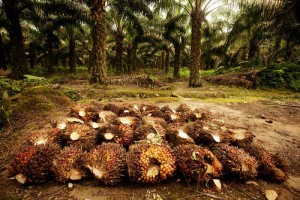
The European Commission’s recent decision to accept palm oil as a “sustainable” transport fuel for the European Union is a huge set back for the protection of Indonesia’s remaining forests.
As our world’s forests are converted into barren commodity concessions, exacerbating the connection between dwindling rainforests & climate change, political decision makers should be doing everything in their power to keep forests standing. Instead, European leaders just endorsed a palm oil certification scheme, the RSPO, that accepts clearing of important secondary forests and peatlands, major sources of the very GHG emissions that the EC claims to be reducing.
Although the EU’s Renewable Energy Directive in theory already prohibits the destruction of forests to grow palm oil, in practice it’s a different story. Mongabay reports:
“Under the [European Commission]-approved RSPO RED scheme, a palm oil company that has both plantations that meet the EU standard as well as plantations that do not meet these standards (e.g. plantations on peat) can sell its palm oil from the eligible plantations as ‘sustainable’ biofuel to the EU and continue with business as usual on the other plantations,” said Wetlands International in a statement. “They could even expand their plantations on peatlands. This sustainability certification is therefore not helping in any way to reduce emissions, but allowing and could even encourage a pick-and-choose strategy that will enhance indirect land use change (ILUC), resulting in the continued destruction of tropical forests and peatlands.”
According to Reuters, the Commission’s own research proves that palm oil has the highest emissions of any biofuel when ILUC factors—the indirect land use change caused by using it for fuel—are considered.
The oil palm industry causes massive emissions of greenhouse gases by driving the deforestation of tropical forests and peatlands, contributing to global climate change and biodiversity loss. Halting expansion into peatlands of any depth, which store vast amounts of carbon if left untouched but become significant greenhouse gas emitters when cleared and burned, is a climate imperative. In 2011 the Indonesian government issued a two-year moratorium on clearing forests of peat deeper than three meters deep, but this oversight fails to protect a huge percentage of peatlands in Indonesia that are less than three meters deep. Banning further expansion on all peat, regardless of depth, offers the best opportunity to drastically reduce emissions from deforestation and degradation associated with palm oil expansion.
Clearing peatlands and secondary forests is not only problematic for our global climate—it’s also driving unique species like endangered orangutans towards extinction.
The timing of this unfortunate decision is critical for many reasons. It comes just as the major global initiative that oversees the RSPO struggles to scale up its sustainability criteria. A dozen of the world’s most prestigious scientists just released a letter pleading with the RSPO to improve its Principles & Criteria, the sustainability guidelines that all RSPO members are supposed to follow.
We call on the RSPO to add two critical additional components to its Principles and Criteria during this review period:
1. A complete ban on future developments on peat.
As noted above, palm production on peatlands result in a large amount of greenhouse gas emissions (both carbon dioxide and methane). Climate change has great potential to wreak havoc on natural and human made systems alike. Therefore, it is impossible for any activity that contributes large amount of greenhouse gas emissions to be considered sustainable. Banning further expansion on peat offers the best opportunity to drastically reduce emissions from palm oil expansion.
2. A ban on future plantings on high carbon stock forests.
We applaud the current RSPO Principles and Criteria for banning the clearing of primary forests and requiring a High Conservation Value (HCV) assessment that aims to protect HCV forests. The RSPO must go further to ensure that lightly and moderately disturbed secondary forests are also protected. These forests are still very valuable both for carbon storage and for biodiversity. A carbon threshold should be established to ensure that land use change remains carbon neutral, or in cases of grassland conversion, might result in net carbon storage.
It is vital that the RSPO add these requirements the Principles and Criteria immediately to ensure that all palm oil being sold with the label “sustainable” is not driving climate change and forest destruction. Without these critical requirements, RSPO standards are not enough for businesses to rely on to meet zero deforestation and low-carbon supply chain commitments and the standards cannot be considered truly “sustainable.”
As the world’s eyes remain on the EPA, waiting to see if it will rule in favor of science and the climate or be swayed by the lobbying muscle of Indonesian and Malaysian government and industry reps, the European Commission’s decision sets a problematic precedent for countries that are trying to decrease emissions.